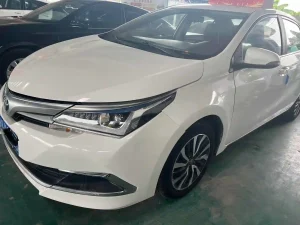Given the price advantage, quality assurance and supportive government policies enjoyed by Chinese used cars in overseas markets. This is a massive price advantage over used cars from the West, with Chinese rolling stock typically 20-30% cheaper on average and therefore much more appealing in developing markets where cost is crucial. Those savings are due to economies of scale in vehicle production and distribution thanks to China's huge domestic market. Exporters, therefore can offer more competitive pricing without sacrificing quality.
Finally, quality has come on in leaps and bounds as Chinese manufacturers have adopted global norms over the years. Sturdy vehicles of the past were slowly replaced by newer, safer and more fuel efficient models from companies like Geely, Changan or Great Wall. A 2022 survey showed that in Africa and Southeast Asia, a majority of buyers were happy with the durability and performance of used Chinese cars prompting repeat buyers. A large proportion of the vehicles are also not overly aged, with many being 3 -5 years old and having relatively low mileage on their odometer that can present better value over used imports from other nations.
Rational government policies have also benefited the Chinese used car export industry. For example, China implemented new measures in 2019 to simplify the export process by minimizing paperwork and shortening customs clearance times up to 30%. Over the years these policies have helped exporters to consolidate and explore newer markets. In say, Tianjin and Guangzhou cities this is done by creating used car export zones which centralizes logistics to makes the whole vehicles exporting operation more efficient for exporters. These areas were responsible for more than 50% of China's export volume as early as April in 2023, which helped to grow this segment at an annual rate of approximately 15%.

Demand in emerging markets is also pushing the appeal of Chinese used cars. In Africa, China is home to the leading Chinese vehicles that are affordable and use spare parts while also being able to adapt with local road conditions in countries like Nigeria and Kenya. The partnership says that over the course of those four years, private buyers and commercial fleets gradually pushed up sales by Chinese vehicles in Africa from 60% to nearly 80%. At the same time, Southeast Asia has been stepping up its purchases of electric vehicles (EVs) and hybrids from China as well in autos drive towards cleaner modes. For EVs, it is the Chinese automakers that are best positioned to meet this demand with competitive pricing and an offer of vehicles selling in much higher numbers internationally.
By the time Chinese exporters arrived, this was compounded with their ability to provide custom (flexible) solutions which ensured they only needed one or several employees. Exporters usually work with the buyer to ascertain their peculiar needs regarding vehicle type, budget and where it would last. This adaptability has allowed individuals to establish long-term relationships with distributors in target markets, which is crucial for a consistent supply chain and satisfied customers.
Competitive prices, timing and quality reliability of used cars from China supplemented with the government incentives are key for deeming China one of the main contender in the global stage. Chinese used cars export platform provides access to many options that conform a varied international standards making it more and more popular among global buyers in search of vehicles from this nascent market.